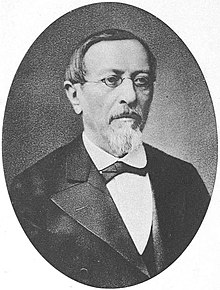
Karl Fedorovich Kessler (19 November 1815 – 3 March 1881) was a Baltic German zoologist who worked as a professor of biology at Saint Petersburg Imperial University. Among his contributions was the idea that evolution at an infraspecific level involved mutual aid and that Charles Darwin had placed too much emphasis on competition which he accepted as occurring at the interspecies level.
Life and work
[edit]Kessler was born in Damrau, Konigsberg where his father was a royal forester (oberforestmeister). His father moved to Novgorod Governorate where Kessler grew up. In 1828 he joined the Third Saint Petersburg Gymnasium with a scholarship and went to Saint Petersburg Imperial University in 1834. He attended the zoology lectures of Stepan Kutorga. After graduation he worked as a school mathematics teacher. In 1837, Kessler and his botanist friend from student days, Nikolai Zheleznov went on an expedition to Finland. In 1840 he defended a master's dissertation on the legs of birds in relation to systematics. In 1842, his doctoral dissertation was on the skeleton of woodpeckers in relation to their classification. He then obtained a zoology chair at the University of Kyiv, a position vacated by Alexander von Middendorff who went to Siberia on an expedition. Kessler collected and examined numerous taxa across the region. He conducted most of his studies of birds in Ukrainian regions of the Russian Empire: Kiev Governorate, Volyn Governorate, Kherson Governorate, Poltava Governorate and Bessarabia. He also studied the fish of the Dniester, Dnieper, and Southern Bug rivers, and on the Ukrainian coast of the Black Sea.[1] Based on the fish fauna, he hypothesized that several of the lakes in the region were earlier connected. He suggested that the Black and Caspian Seas had separated early and that the Black Sea and the Mediterranean had been connected by streams. Thus he was among the early zoogeographers.[2] In 1862, he replaced Stepan Kutorga at Saint Petersburg Imperial University. Here he established a zoology department. A year after the first congress of Russian naturalists and doctors, he founded the Saint Petersburg Society of Naturalists in 1868, and in an address to the society in 1879 he proposed that mutual aid, rather than mutual struggle, was the main factor in the evolution of a species. The anarchist Peter Kropotkin later developed this theory in his book Mutual Aid: A Factor of Evolution.
Eponymy
[edit]Numerous species have been named after Kessler including Kessler's gudgeon (Romanogobio kesslerii), Ponticola kessleri, Barbus kessleri, and Turdus kessleri.[3]
See also
[edit]- Category:Taxa named by Karl Kessler
- Antoine Laurent Apollinaire Fée
- Jean-Charles Houzeau
- Alphonse Toussenel
References
[edit]- ^ Sideleva, V. G. (2017). "Contribution of Karl Fedorovich Kessler (1815−1881) to fish systematics and faunal research". Journal of Ichthyology. 57 (3): 473–483. doi:10.1134/S0032945217020187. ISSN 0032-9452. S2CID 255278866.
- ^ Н.н, Банина (2010). "Карл Фёдорович Кесслер (1815-1881) как учёный и общественный деятель". Русский орнитологический журнал. 19 (616): 2155–2173. ISSN 1026-5627.
- ^ Christopher Scharpf & Kenneth J. Lazara (22 September 2018). "Order CYPRINIFORMES: Families ACHEILOGNATHIDAE, GOBIONIDAE and TANICHTHYIDAE". The ETYFish Project Fish Name Etymology Database. Christopher Scharpf and Kenneth J. Lazara. Retrieved 4 March 2021.
External links
[edit]![]() Media related to Karl Kessler at Wikimedia Commons
Media related to Karl Kessler at Wikimedia Commons